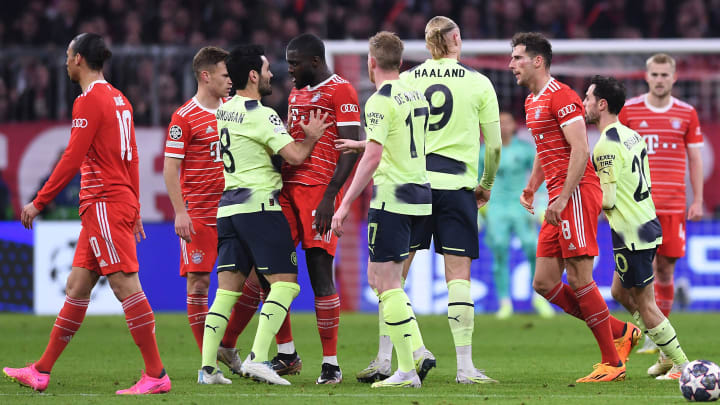Manchester City Shows Rare Champions League Poise in Eliminating Bayern Munich

The score line, perhaps, was more decisive than the tie, which was summed up by a 20-second spell in the 57th minute. Kingsley Coman darted into the right side of the Manchester City box and drove the ball across goal. Ederson got a hand to it, and his intervention caused the ball to spin away from Eric Maxim Choupo-Moting. The ball squirted parallel to the goal line, two yards out, offering a tap-in had any Bayern player been in the vicinity.
They were not. John Stones gathered and belted the ball clear. After heading the ball down for Kevin De Bruyne, Erling Haaland carried on, accepted the return and, after the hapless Dayot Upamecano had slipped, smashed his finish past Yann Sommer. Suddenly City led Bayern 1–0 on the night, and, although a Joshua Kimmich penalty later made the aggregate score 4–1, Man City’s passage to a semifinal against Real Madrid was secure.
It doesn’t take long for Erling Haaland to bounce back! Another goal for the Man City star
— SI Soccer (@si_soccer) April 19, 2023
(via @TUDNUSA)pic.twitter.com/I4bzmndV57
Bayern played well over the tie, in many ways better than it had in beating Paris Saint-Germain in the previous round. Thomas Tuchel, who was sent off from the touchline late on for his constant protests, has not had a good start to life as Bayern manager with only two wins in his last seven games, but he can feel a little unfortunate here. Three of the four goals across the tie were the result of individual errors. His plan caused City as many problems as any side has in its current run of 11 successive wins. And yet still City was better.
That opening goal perhaps showed what this City has that previous iterations have not: a focal point up front that can win even speculative long balls, and a player who, even after missing a penalty and one other very presentable chance, has the self-confidence to bully a goal. Haaland turns the margins his side’s way.
The damage really was done in the first leg. As in that first leg, Bayern had its moments. And just like at the Etihad, Bayern did, at time, threaten to get in behind City’s high line, the best opportunity falling to Leroy Sané, but he clipped his finish just wide. Had that gone in, after 11 minutes, perhaps some pressure could have been applied. But the longer the game went on, inevitably, the more improbable Bayern’s task began to look, which in turn had an impact on the stadium atmosphere. Jamal Musiala slipped when well positioned on pretty much the same patch of turf where Upamecano later slipped—Stones also lost his footing in a similar area.
City, perhaps a little tentative, created only one real chance in the first half, a penalty awarded for what UEFA believes is a foul and what the Premier League does not. Upamecano often seems an accident waiting to happen in big games, and had already been shown a red card for a clumsy barge on Haaland as he ran clear before being reprieved by a belated offside flag, when he was penalized for a handball in the box.
He had gone to close Jack Grealish down with his arms tucked behind his back, but as he braced himself for the block, half-turning away, his left arm crept away from his side. The ball brushed his forearm, and that was enough for match official Clément Turpin to point to the spot: a decision correct in law but absurd in every other respect since there was no sense in which Upamecano was trying to cheat. After a lengthy delay, in part caused by gamesmanship from Bayern’s players and in part by an object being thrown onto the pitch, a spooked Haaland fired his penalty over the bar.
Erling Haaland misses the penalty against Bayern!
— SI Soccer (@si_soccer) April 19, 2023
(via @TUDNUSA)pic.twitter.com/diGLZVXfTe
Bayern was then given a very similar handball nine minutes from time as Sadio Mané’s cross hit Manuel Akanji’s arm. Again the decision was technically correct; again a blameless defender was essentially penalized for having a hand. Fortunately, neither decision was particularly consequential, but at some point it will be, and football will wonder why it decided the game should be governed by asking whether some excuse could be found to give a penalty rather than whether a player had tried illegally to gain an advantage. Kimmich converted, but it was too late for a possible comeback.
Bayern Munich pulls one back thanks to a Joshua Kimmich penalty!
— SI Soccer (@si_soccer) April 19, 2023
(via @TUDNUSA)pic.twitter.com/RQmvV0cxY5
In the last 11 games, City has scored 38 goals and conceded just five. It has found a structure and a balance that could carry it to a treble. It has adjusted to Haaland, who at times earlier in the season, seemed to have disrupted the side. City perhaps doesn’t control games as it used to, but the flip side is a greater potency, particularly in transition.
The hamstring injury suffered by Nathan Aké after 66 minutes could shake that sense of remorseless serenity, but this was a performance of great maturity, one to suggest this could be City’s year at last.
